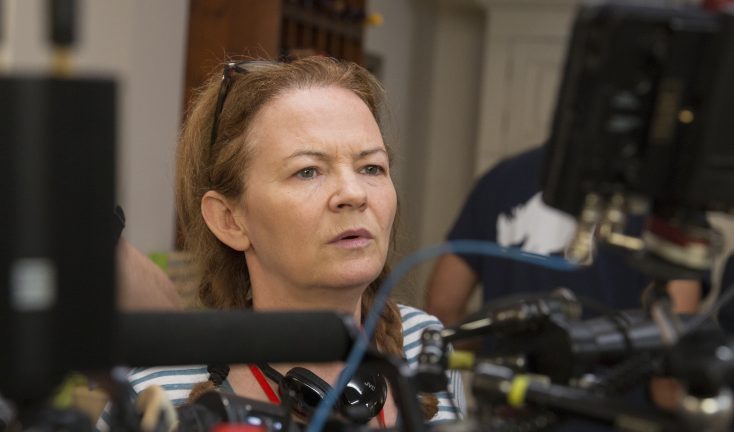
(L to R) Oscar® winners RENÉE ZELLWEGER and EMMA THOMPSON in BRIDGET JONES’ BABY. ©UNIVERSAL STUDIOS. CR: Giles Keyte
By ANGELA DAWSON
Front Row Features
HOLLYWOOD—Sharon Maguire directed then up-and-coming actress Renee Zellweger to international fame in 2001’s “Bridget Jones’s Diary.” The romantic comedy, based on Helen Fielding’s bestselling novel about a young, single British journalist (played by Oscar winner Renee Zellweger) and her romantic escapades with two handsome suitors (played by Hugh Grant and Oscar winner Colin Firth), raked in a nearly $282 million worldwide.
Maguire, then a first-time feature film director, had more than a passing connection to the film. She also was a friend of Fielding, who based one of the characters in the book (and subsequently the film) on her.
With the success of that freshman effort, Maguire received numerous offers from Hollywood and her native UK to make more films. Instead, she fell in love with British filmmaker Anand Tucker, and went off to start a family. Having now reared three children, Maguire is back for the third installment of “Bridget Jones”—the 2004 sequel, “Bridget Jones: The Edge of Reason,” was helmed by Beeban Kidron—“Bridget Jones’s Baby.” (The due date for the novel is Oct 11.)
Speaking by phone from London, Maguire, 55, enjoys a cup of tea as she chats about returning to helm the beloved “Bridget Jones” franchise. Personable and quick to laugh, Maguire says reconnecting with cast was a joy after a decade and a half. (Only Hugh Grant opted not to return.) Back in the title role is Zellweger, who easily slips into the sexy, down-to-earth, charmingly human British journalist, now a successful TV talk show host producer. Firth reprises his role as the tightly wound Mark Darcy, Bridget’s ex-boyfriend who has moved on to another relationship. That is, until he and Bridget reunite at a christening and long suppressed romantic feelings reemerge.
Meantime, Bridget’s one-night-stand with a handsome and charming American (Patrick Dempsey, best known for playing Dr. Derek “McDreamy” Shepherd on TV’s “Grey’s Anatomy”) becomes something bigger when our 40-something heroine discovers she’s pregnant. Who the fetus’ father is is anyone’s guess. No matter. Both men, smitten and overcome with daddy fever, are determined to prove themselves worthy of Bridget’s affections, at any cost. Crazy antics ensue as Bridget logs the craziness that is her life in her digital journal.
Fielding shares screenwriting credit with Dan Mazer and Emma Thompson, who also has a small but scene-stealing role as Bridget’s bemused obstetrician.
“Bridget Jones’s Baby” marks Maguire’s comeback to fulltime directing, having co-founded a British production company called Seven Stories with her husband a year ago. Together, they have several TV projects and a film in development.
Q: It’s been 15 years since the first one. You skipped the second. What brought you back for the third?
Maguire: Money! I went away to breed, to have children. I made my first film when I was 36 or 37. Then, I went off to Hollywood to make some movies. While there, I managed to net a man and get pregnant. There was a movie I was going to be involved in but I then was giving birth on the first day of shooting. Then I had the baby bug, and I had another one after that. I thought it was time take some time off from my career, a runaway train, and do mum stuff.
When I thought I’d start working again, No. 3 popped out. I did one movie in there and did some TV and some writing in-between. Directing is so full on, you know you’re not going to be around to see your kids for a year or more. You have to give it everything. I wanted to give my everything to being a mom and having kids. I’d never been one before. This script just landed at the right time. I was thinking, “Oh my Lord, it’s 15 years later. Is it going to be strange reading this? Have these characters achieved their fantasies? I’m going to have to compare it to my own life.”
Then, I started reading it, and I started laughing, and I thought, what the heck. Life is like that. I think the whole thing is imbued with the idea of fantasies and whether your fantasies come true.
Q: Mark and Jack are bitter rivals but they also try to help Bridget the best they can.
Maguire: Yes, it’s a bit of a bromance. That bromance continued into the real lives of (Colin Firth and Patrick Dempsey). I couldn’t separate them; they love each other very much. That was where the chemistry was.
We wanted to cast someone American and dreamy and almost as soon as the words were out of my mouth, someone said, “Of course, Patrick!”
Q: With one big exception, you were able to wrangle most of the original cast back together.
Maguire: We are a bit of a dysfunctional family. When we first set out on this journey, I was a first-time director, and I learned a lot. I wanted to cast people I could learn from. It was a great experience. I got along with the actors. We did a lot of experimenting. I gave them a lot of space to try things. And it was a very good experience. I guess it worked out. Had it not worked out, maybe they would not be so keen to have me back.
It was great to get them all back again. We all really enjoy working with each other. But it also was important to bring new life to it, new sources of humor and bring younger characters into it so younger people will like Bridget too, I hope. So we brought in Sarah Solemani and her character, Miranda, who represents the new generation for Bridget Jones. That’s a different world; that’s a sort of Tinder generation. There’s also Kate O’Flynn, who plays Alice Peabody (Bridget’s unforgiving Millennial boss). So it was nice to have some of these new characters—old family and new family.
Q: Was Renee Zellweger a little nervous to come back to this role? Did you have to reassure her or coax her?
Maguire: When we came on board with this in late 2014/early 2015, there was a script that she and I liked. It needed some work, a bit of development, but we were very happy with the storyline and where it was going. There was no coaxing needed when she knew we were going to go with that story. She has a lot of integrity for this character. She needs the story to be right and all the rest of it and so do I. So there was no cheerleading. She was onboard. It was a great chance for us to work together again. There’s nothing we love more than doing physical comedy and she’s a genius at it.
Renee works so hard and she’s always brilliant. She never fails to surprise me. She comes to set with 10 different choices all the time. None of them fail to make me laugh. I love her. She’s so good at this. Both her and Colin are seriously decent human beings.
Q: You can’t ignore that Hugh Grant didn’t return. Was the script written with him in it or did it change when he decided not to return?
Maguire: When I got the script, there already was the new guy—an American called Jack Qwant. That’s how the new storyline was conceived. I don’t think it’s the end of (Grant’s character) Daniel Cleaver.
Q: One of the notable differences between this film and the original is that Bridget does all of her diary entries on an iPad instead of writing them in a journal.
Maguire: We had a lot of discussion about that: whether she still had the diary or wrote on an iPad. There was a lot of debate about that. I’m glad we went with the iPad in the end. It was more personal when she was writing by hand but when we added the sound effects when she was tapping on the iPad, and she would make mistakes, I think it gave it the personality that we wanted. I keep my diary on a computer. I usually write in it when things are going wrong.
Q: Is it true that you shot different endings so as the secret wouldn’t get out before the film was released?
Maguire: Yes, we shot two endings. The test audiences had firm ideas on who it should be; it was really divided down the middle. It was a good debate on that one. I wonder what everybody will make of it. I wanted them both to have it. I wanted her to be with both of them forever. But there are so many convoluted families nowadays, especially among my friends.
Q: As Bridget’s obstetrician, Emma Thompson steals every scene she’s in in the film.
Maguire: It was quite a brave way to go because when we were film scenes, she rarely made eye contact with anybody—with Renee. I said, “Should we do another choice where she has more eye contact?” We chatted about it and she said, “No, I think this character is almost as English constipated as Mr. Darcy. She finds it very hard to have a human connection, to the point where if she makes a joke, she laughs like a hyena.” And I think she absolutely nailed it by taking that path. She’s brilliant. They’re all brilliant. At one point, we had three Oscar winners in one scene—Emma, Renee and Colin.
Q: Speaking of adding young cast members to draw a wider audience, I’m sure it was quite a coup to get internationally acclaimed pop star Ed Sheeran to appear in this. Was he comfortable on camera?
Maguire: I’ll be honest with you, it’s kind of terrifying when you know you’re going to have a pop star in your film with no acting experience. I was worried we might have a bunch of eyebrow acting. But he came in and he nailed it. He was so subtle in how he did it. He was huge fun and very game. He recorded the song live for us and he did the scene. Once he read the scene, he was very up for it. He loved the scene. It cuts him down in a way, but he found it hilarious. He was great; he’s a good actor. My 12-year-old is a huge fan of his so for me to put him in the movie was so exciting. I got major points for that.
Q: Did Helen Fielding visit the set?
Maguire: Yes. She visited the set. We filmed it mainly in the UK.





